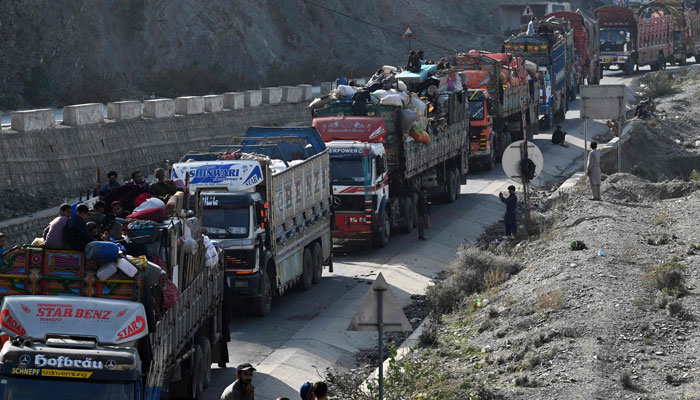Pakistan opens more border centres to expedite repatriation of illegal immigrants
Over 165,000 Afghans have fled Pakistan; more continue to amass at Pak-Afghan border awaiting to be processed
November 03, 2023

- 147,949 Afghans fled via Torkham; 50,000 went back via Chaman.
- Govt had announced Nov 1 deadline for illegal foreigners to leave.
- Facilities strengthened at borders to cater to high refugee influx.
PESHAWAR: Pakistan on Friday opened more border centres to expedite the repatriation of Afghan citizens illegally residing in the country.
Nearly 200,000 Afghans have fled Pakistan following the expiry of the government's November 1 deadline to leave the country voluntarily or face forced expulsion.
A large number of people have since then amassed on the Pak-Afghan border overwhelming the infrastructure and facilities as both sides strive to speed up the processing of those returning to Afghanistan from Pakistan.
Pakistan, citing security concerns, has taken a stringent stance saying Afghan nationals have been behind militant attacks, smuggling, and other crimes in the country.
Caretaker Interior Minister Sarfraz Bugti had revealed that Afghan nationals were found to be responsible for 14 of 24 suicide bombings in Pakistan in recent times.
Meanwhile, Afghanistan has denied claims of Afghan citizens being involved in terror incidents in Pakistan.
Mullah Hassan Akhund, prime minister of the Taliban-led administration has invited Pakistan to come to the table and "talk face to face" on the issue.
Facilities at the main northwestern border crossing of Torkham have been boosted three times to cater for the rising number of returnees, said Abdul Nasir Khan, deputy commissioner for Khyber district.
"Everything is normal now as the returnees no longer need to wait in queues for hours," he told Reuters.
"We spent three days on the border in Pakistan," said Mohammad Ismael Rafi, 55, who said he lived for 22 years in the southwestern Pakistani border town of Chaman where he had a retail business.
He said that it took him six days to leave his home in Pakistan with his 16 family members and belongings to reach a makeshift tent village on the other side of the border.
Afghan schoolboy Sarfraz, 16, who goes by one name, said he and his father had never visited Afghanistan and did not want to go there now as his grandfather migrated to Pakistan decades ago.
Transit facilities
The Taliban administration in Afghanistan, scrambling to cope with the sudden influx, has set up temporary transit camps where food and medical assistance will be provided.
Refugee groups have reported makeshift camps being overwhelmed due to the sheer number of people as more continue to pour in.
Many of the migrants fled Afghanistan during the decades of armed conflict since the late 1970s, while the Taliban's takeover after the withdrawal of US-led coalition forces in 2021 led to another exodus.
Khan, the official, said 19,744 Afghans had crossed the Torkham border on Thursday, 147,949 in total since the government announced the deadline.
More than 50,000 have left through southwestern Pakistani border crossing at Chaman, the minister for information in Balochistan, Jan Achakzai, told Reuters.
Pakistani authorities said they were open to delaying repatriation for people with health or other issues, including a seven-month pregnant woman who was told on Friday to stay in Pakistan until she had given birth.
Islamabad says many of the undocumented Afghans have obtained national identity cards through illegitimate means. The government has been identifying and blocking all such suspected cards.











